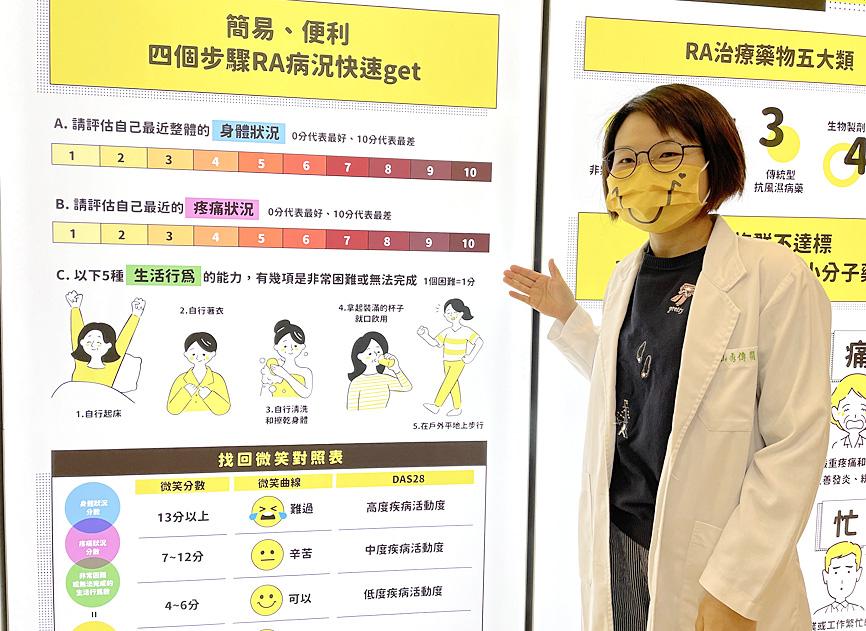Up to 90 percent of people with rheumatoid arthritis do not know their treatment goals, the Taiwan League Against Rheumatism said on Friday as it launched a simplified one-minute scale for patients to assess their condition and manage their treatment goals.
League executive director Tsai Chang-youh (蔡長祐), who is also Taipei Veterans General Hospital’s Division of Allergy, Immunology and Rheumatology director, said that rheumatoid arthritis is a chronic autoimmune disorder that can cause the immune system to attack healthy tissue in the joints, causing severe inflammation.
There are about 100,000 to 200,000 people with rheumatoid arthritis in the nation, and women are more likely to develop the condition than men, he said.

Photo: CNA
However, about 30 percent of people with rheumatoid arthritis failed to get regular checkups during a local COVID-19 outbreak this year, he said, adding that if their condition is not monitored, the disorder can cause systemic inflammation, swelling, joint pain and even joint deformity.
The league gave the example of a 32-year-old nurse, surnamed Cheng (鄭),who has managed her arthritis for the past 15 years.
Cheng first developed wrist pain at age 17, but initially dismissed it as a side effect of her internship as a nurse.
However, the pain intensified over the course of a week and spread to her body, causing her to have difficulty walking. She sought treatment at an emergency room and was diagnosed with rheumatoid arthritis.
Cheng said cool and damp weather worsen her symptoms, causing increased swelling and pain at the joints, and making simple daily tasks, such as taking a mask off or brushing her teeth, difficult.
League chairperson Tsai Shih-tzu (蔡世滋) said there are treatment goals for different diseases.
Doctors use a measure called DAS28 — in which DAS refers to “disease activity score” and 28 refers to the number of painful or swollen joints — to determine the severity of rheumatoid arthritis in a person, he said.
The main treatment goal should be controlling inflammation, easing pain and reducing disability, he added.
However, he said up to 90 percent of people with rheumatoid arthritis do not know the primary goal of treatment or when they should seek medical attention.
Tsai Chang-youh said the league prepared a one-minute scale to help people with rheumatoid arthritis assess and record their condition regularly, so that they can discuss it with their doctor during checkups to come up with effective treatment plans.
The scale asks people several questions — including their general pain level and whether they have difficulty in getting up from bed, putting their clothes on, and filling a cup with water and drinking it. The answers add up to different scores that indicate the severity of their condition.
Tsai Shih-tzu said cold and damp weather worsen rheumatoid arthritis symptoms, and although the condition cannot be cured, patients can monitor their conditions and relieve their symptoms through treatment to attain a better quality of living.

An essay competition jointly organized by a local writing society and a publisher affiliated with the Chinese Communist Party (CCP) might have contravened the Act Governing Relations Between the People of the Taiwan Area and the Mainland Area (臺灣地區與大陸地區人民關係條例), the Mainland Affairs Council (MAC) said on Thursday. “In this case, the partner organization is clearly an agency under the CCP’s Fujian Provincial Committee,” MAC Deputy Minister and spokesperson Liang Wen-chieh (梁文傑) said at a news briefing in Taipei. “It also involves bringing Taiwanese students to China with all-expenses-paid arrangements to attend award ceremonies and camps,” Liang said. Those two “characteristics” are typically sufficient

A magnitude 5.9 earthquake that struck about 33km off the coast of Hualien City was the "main shock" in a series of quakes in the area, with aftershocks expected over the next three days, the Central Weather Administration (CWA) said yesterday. Prior to the magnitude 5.9 quake shaking most of Taiwan at 6:53pm yesterday, six other earthquakes stronger than a magnitude of 4, starting with a magnitude 5.5 quake at 6:09pm, occurred in the area. CWA Seismological Center Director Wu Chien-fu (吳健富) confirmed that the quakes were all part of the same series and that the magnitude 5.5 temblor was

The brilliant blue waters, thick foliage and bucolic atmosphere on this seemingly idyllic archipelago deep in the Pacific Ocean belie the key role it now plays in a titanic geopolitical struggle. Palau is again on the front line as China, and the US and its allies prepare their forces in an intensifying contest for control over the Asia-Pacific region. The democratic nation of just 17,000 people hosts US-controlled airstrips and soon-to-be-completed radar installations that the US military describes as “critical” to monitoring vast swathes of water and airspace. It is also a key piece of the second island chain, a string of

The Central Weather Administration has issued a heat alert for southeastern Taiwan, warning of temperatures as high as 36°C today, while alerting some coastal areas of strong winds later in the day. Kaohsiung’s Neimen District (內門) and Pingtung County’s Neipu Township (內埔) are under an orange heat alert, which warns of temperatures as high as 36°C for three consecutive days, the CWA said, citing southwest winds. The heat would also extend to Tainan’s Nansi (楠西) and Yujing (玉井) districts, as well as Pingtung’s Gaoshu (高樹), Yanpu (鹽埔) and Majia (瑪家) townships, it said, forecasting highs of up to 36°C in those areas